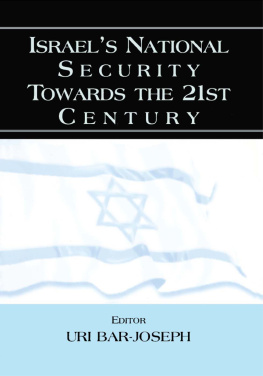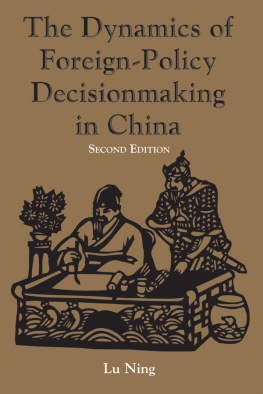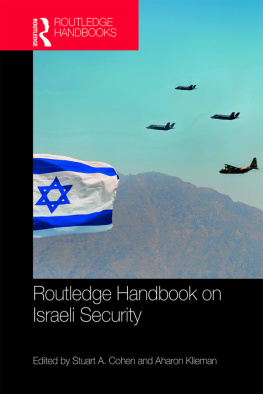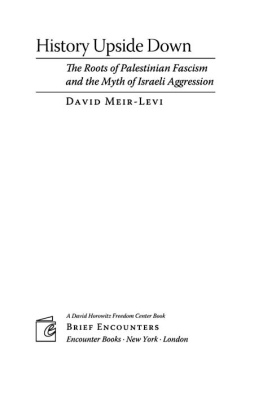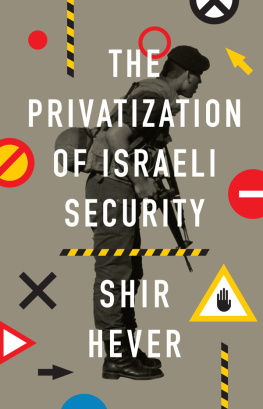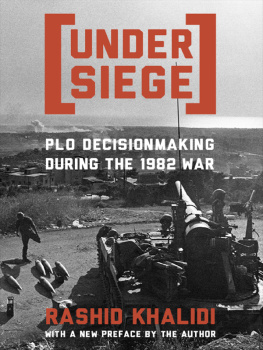First published 1986 by Westview Press
Published 2018 by Routledge
52 Vanderbilt Avenue, New York, NY 10017
2 Park Square, Milton Park, Abingdon, Oxon OX14 4RN
Routledge is an imprint of the Taylor & Francis Group, an informa business
Copyright 1986 Tel Aviv University Jaffee Center for Strategic Studies
All rights reserved. No part of this book may be reprinted or reproduced or utilised in any form or by any electronic, mechanical, or other means, now known or hereafter invented, including photocopying and recording, or in any information storage or retrieval system, without permission in writing from the publishers.
Notice:
Product or corporate names may be trademarks or registered trademarks, and are used only for identification and explanation without intent to infringe.
ISBN 13: 978-0-367-00677-8 (hbk)
The study of national security decisionmaking is fraught with pitfalls. This statement holds true for any researcher, but all the more so for someone like this author, who has been actively engaged for many years in national security decisionmaking, at times at the highest levels. From the outset, I have been aware of the dangers of subjectivism, of injecting my own political attitudes and opinions, preconceived notions and biases into the material, the analyses and especially the conclusions and recommendations. I have endeavored, to the best of my ability, to undertake this research with the disinterested curiosity and objective neutrality which should be the hallmark of a good scientist and researcher. But no one can be totally disinterested in a process which has a direct bearing on his life and well-being; thus the only guarantee of the objectivity of such a work is the constant recognition and awareness of the danger of going astray, the advice and criticism of ones colleagues and, in the final analysis, ones own conscience.
In researching and writing this study, I have benefited from many others, to all of whom I am deeply grateful. I owe much of the first section to the writings and works of Alexander George, Robert Jervis and Irving Janis. The section on Israel, which is the heart and essence of this study, is based primarily on a series of in-depth interviews with individuals who, at different periods in Israels history, have been key actors in the national security decisionmaking process. I wish to acknowledge the complete cooperation of all those interviewed a detailed list of whom appears at the end of this study. I myself was at times surprised and even taken aback by their candidness, frankness, and sincere desire to help, and I only hope that the reader will be as appreciative of their efforts and cooperation as I am. I would like to mention specifically Professor Yehezkel Dror, to whom I am deeply indebted for the many insights I gleaned from reading his numerous articles and reports, as well as for the personal advice and help he gave me in preparing this work, and Mordechai Gazit, to whom I am deeply grateful for the many hours he spent with me and for his constructive criticism of the original draft.
Finally, I would also like to thank my colleagues at the Jaffee Center for Strategic Studies (JCSS) for their advice, their help, and their many worthwhile suggestions which greatly improved this work. Specifically, I would like to mention Moshe Grundman, Director of the JCSS Information and Documentation Center, who spared no effort to make available to me any material or publication which could be of help, and Dr. Mark Heller, Deputy Head of the Center until mid-1986. Joseph Alpher, who succeeded him as Deputy Head of Center, offered invaluable assistance in the editing of this manuscript.
A special word of thanks to the Head of JCSS, Maj. Gen. (Res.) Aharon Yariv. It was he who originally encouraged me to undertake this assignment, and who continued to give me intellectual guidance, support, and encouragement through to its completion. Finally, while many have aided me in the preparation of this study, its drawbacks and limitations are my own and, in the final analysis, I alone bear responsibility for its contents.
This work consists, basically, of four sections. is an overview of the national security decisionmaking process. It serves two purposes. The first is to present a general background for this research project, outline its scope, and define some of the key terms and concepts with which it deals. The second is to offer an overview of the decisionmaking process itself, drawing attention to those common factors which cut across time and space and are to be found in all instances of decisionmaking. These factors include critical procedural tasks for effective decisionmaking, possible and probable malfunctions at different points along the process, the role of personality and organizational factors, and, last but not least, psychological and social-psychological principles and theories underlying individual and group behavior relative to decisionmaking.
Alexander George has pointed out that contributions to research on decisionmaking and on foreign policy planning have come not only from those with practical experience in foreign policymaking, but also from specialists in the behavioral sciences, such as psychologists and sociologists. The taking of a decision at a given point in time is, in the final analysis, an instance of human behavior and, as such, it falls under the purview of psychology. Moreover, since decisions are usually made in small groups, decisionmaking also falls within the domain of social psychology. Indeed, the two theoretical areas which have been found most relevant to national security decisionmaking are cognitive psychology both from an informational processing approach, as in attribution theory, and from a motivational-emotional point of view, as in cognitive dissonance theory and small group research or group dynamics. I have thus tried to bring to this work not only my practical experience in foreign affairs, but also my professional training as a social psychologist.
The second section presents a comprehensive survey of the institutions, systems, procedures and mechanisms established by key western states to deal with the task of deciding crucially important issues of national security. It is, in effect, a comparative study across countries and governments. The purpose of this section is to provide the multi-national context for a detailed examination of the Israeli experience in national security decisionmaking. For such an analysis which is the main purpose of this work can only be properly made in a multi-national context, i.e., in relation to the state of the art as practised by other democratic governments. No two countries are alike, and Israel is, perhaps, unique in the scope of its national security concerns, and the complex context of its decisionmaking. Nevertheless, many common factors are involved with regard to the socio-political-psychological phenomenon of decisionmaking, as well as to the definition and nature of national security.
Thus, although no country can serve as a direct model for the decisionmaking process in Israel, each example is, nevertheless, definitely and directly relevant. This is so because all differences aside, a large common denominator underlies all forms of democratic government. It comprises public debate, a free press, legislative oversight, domestic political considerations, certain dominant values, personal responsibility and accountability of political leaders, the need for wide consensus on national security issues to mention but a few aspects. National security decisionmaking in any democracy is performed against a common background, in a very similar context, and with very much the same set of constraints. In evaluating the decisionmaking process in Israel, the experience and models offered by other democracies can be very useful when trying to devise ways and means to improve that process.




